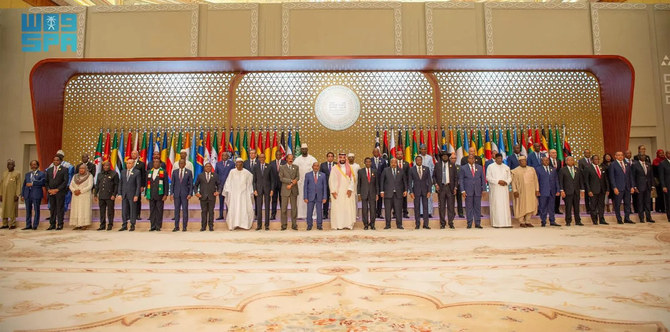Dr. Mohammed Al-Sulami
The first Saudi-African Summit was held in Riyadh on Friday. Despite the ongoing events in Gaza and Saudi Arabia’s focus on resolving that crisis, the Kingdom continued with its desire to host this important summit, reflecting the attention it pays to the African continent, as well as its flexibility, ability to handle multiple files and the importance of its foreign policy calculus.
Saudi Arabia wanted this summit to result in a significant advancement in its relations with African nations, the creation of frameworks for collaboration and the execution of stated goals and plans. Both parties today place a high value on strengthening their relations.
There is no doubt that Saudi Arabia is giving special attention to its relations with African nations. This comes within the framework of the economic diplomacy adopted by Riyadh, which seeks to deepen partnerships with various vital spheres and regions, the most prominent of which is, of course, Africa. This attention also comes as part of the pioneering Saudi foreign policy and its aspirations, which are driven by a desire to achieve security and stability throughout the entire region, including Africa, which is facing a mounting wave of instability. This, in turn, provides a favorable environment for investment and economic cooperation, which yields development and welfare for the peoples of both sides. This is especially true as Africa is considered a land of opportunities and is home to diverse resources, while it also possesses a large market. Geographically speaking, Africa is of geostrategic importance and effectiveness in achieving security and stability in the Red Sea and West Asia. On its soil, major regional and global powers are vying for influence. Saudi Arabia is willing to enhance its strategic weight through strengthening its ties with the continent. This comes in the light of a restive international environment.
This Saudi orientation is met with aspirations on the part of African nations to deepen their cooperation with Saudi Arabia. This comes as African nations are also looking to forge credible partnerships that go beyond the traditional form of ties with the old colonial powers, which exploit the continent’s resources and deal with it through unjust terms and diktats, pushing the course of interests in only one direction and controlling ruling regimes through staging military coups. This has, in recent decades, left the continent off the course of development and stability. At the regional level, Saudi Arabia is considered an important option for Africa, a source of strength and balance and an alternative to the global powers, which have ambitions and interventions that aim to undermine security and stability on the continent and contribute to deepening crises rather than resolve them.
In addition, the Kingdom is presenting a model that is gaining regional and global attention, given the accelerating accomplishments being made at the political and economic levels. It is an independent model of governance whose aspirations see eye to eye with those of the new African leaders, which aim to break free from the restrictions of the major world powers and the subordination of old and new colonial powers. Saudi Arabia has pioneering experience in addressing extremist and violent groups. It stands out as an inspiring model at a time when African nations are looking for partners in combating terrorism and extremism, which have become among the biggest impediments to advancement and development throughout the continent. The international actors exploit Africa to deepen their clout and increase their presence without paying heed to the continent’s security and stability, as is the case in the Sahel, the center of the continent and Sudan.
Saudi Arabia possesses massive financial resources, which could assist the countries of the continent in overcoming their social and economic crises. Thus, deepening Africa’s partnership with Saudi Arabia, which is a heavyweight actor within regional and international organizations, serves the interests of African countries. What is more, African countries have a major share of the votes in these organizations, which creates some sort of clout and influence on the global stage, which could be employed to serve both sides’ interests. On the other side, Saudi Arabia’s emergence as a stimulant of regional stability and the diplomacy of mediation it adopts make it eligible for an important role in calming and settling the disputes and crises gripping the continent. This is the role that Africa needs at a time when several of its countries are plagued by instability, rampant coups, the intervention by military companies such as Russia’s Wagner and its ilk, and proxy wars.
There is no doubt that the Kingdom’s standing and its various international partnerships enable it to become an important bridge for the flow of interests toward African countries. Through Saudi Arabia’s relations with China, the Belt and Road Initiative gathers the momentum required to include the eastern part of Africa, its heart, the Sahel and southern parts of the continent. Additionally, the Kingdom’s strategic relations with the US could allow for the inflow of important investments. For example, there are important Saudi understandings on investments in the field of rare minerals in Africa, which enhance the process of transitioning to clean energy and could bring benefits to the continent.
The summit’s outcomes were positive, with Crown Prince Mohammed bin Salman unveiling an ambitious plan to increase the Kingdom’s diplomatic presence in Africa, with the number of Saudi embassies set to exceed 40. This diplomatic initiative is in line with plans to accelerate investment in the continent. Saudi Arabia has also committed a huge $50 billion in a range of development projects across the continent, which will strengthen Saudi-African economic relations. By making such a staggering investment, the Kingdom aims to foster stability and security not only in Africa but in the global environment as well. These initiatives will open up new horizons for opportunities and collaborations between the two sides. In addition, Saudi Arabia will position itself as a key geopolitical actor in the continent and leverage itself to outcompete other regional actors, such as the UAE, Turkiye and Iran.
To conclude, as Africa seems to be caught in the crossfire of international competition, while at the same time gripped by disputes and crises, it needs an advanced strategic partnership with Saudi Arabia. This comes as Riyadh has become an important and influential actor in the new global order that is being shaped. It also has a pioneering project with security and economic facets, which could be copied by the continent’s countries as they seek to find a way out of their crises. Within the framework of the diversification of the Kingdom’s partnerships and its role as a stimulant of security and stability, as well as its regional and international aspirations, enhancing the Saudi presence throughout the continent has become a necessity. It is an inevitable step dictated by the current realities and Saudi Arabia’s role and standing in the continent, not to mention its strategic interests.







